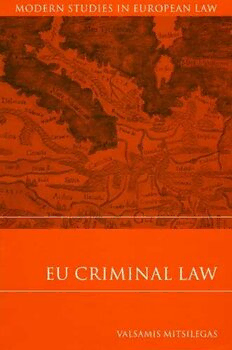
EU Criminal Law (Modern Studies in European Law) PDF
365 Pages·2009·1.862 MB·English
Most books are stored in the elastic cloud where traffic is expensive. For this reason, we have a limit on daily download.
Preview EU Criminal Law (Modern Studies in European Law)
Description:
EU criminal law is perhaps the fastest-growing area of EU law. It is also one of the most contested fields of EU action, covering measures which have a significant impact on the protection of fundamental rights and the relationship between the individual and the State, while, at the same time, presenting a challenge to State sovereignty in the field and potentially reconfiguring significantly the relationship between Member States and the EU. This book examines: the history and institutions of EU criminal law (including the evolution of the third pillar and its relationship with EC law) u harmonization in criminal law and procedure (with emphasis on competence questions) u mutual recognition in criminal matters (including the operation of the European Arrest Warrant) and accompanying measures u action by EU bodies facilitating police and judicial co-operation in criminal matters (such as Europol, Eurojust, and the Office Europ?en de Lutte Anti-Fraude/the European Anti-Fraud Office) u the collection and exchange of personal data, in particular via EU databases and co-operation between law enforcement authorities u and the external dimension of EU action in criminal matters, including EU-US counter-terrorism co-operation. The analysis is forward-looking, taking into account the potential impact of the Lisbon Treaty on EU criminal law.
See more
The list of books you might like
Most books are stored in the elastic cloud where traffic is expensive. For this reason, we have a limit on daily download.
